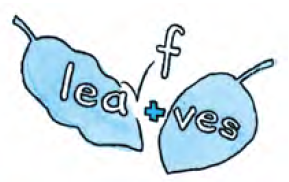Many nouns that end in ‑f are made plural by changing the ‑f to ‑v‑ and adding ‑es.
+----------+-----------+
| Singular | Plural |
+----------+-----------+
| half | halves |
| leaf | leaves |
| shelf | shelves |
+----------+-----------+

But some nouns that end in ‑f are made plural simply by adding ‑s.
+----------+-----------+
| Singular | Plural |
+----------+-----------+
| chief | chiefs |
| roof | roofs |
| cliff | cliffs |
+----------+-----------+
Some nouns that end in ‑f can be made plural in two ways, either by adding ‑s or ‑ves:
+----------+--------------------+
| Singular | Plural |
+----------+--------------------+
| scarf | scarfs or scarves |
| hoof | hoofs or hooves |
| dwarf | dwarfs or dwarves |
| wharf | wharfs or wharves |
+----------+--------------------+
Now my question is how to determine whether to use only ‑s or to change the ‑f to ‑v‑ and add ‑es?
